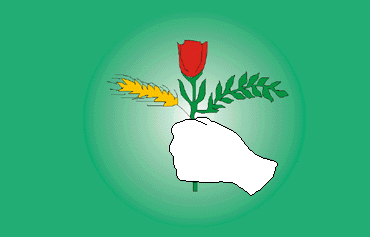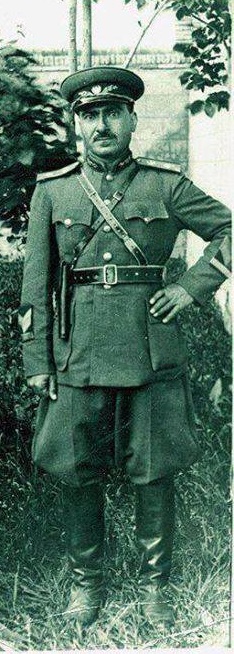|
Ibrahim Ahmad
Ibrahim Ahmad (6 March 1914 – 8 April 2000) (alternatively spelt Ibrahim Ahmed or Ibrahîm Ehmed) ( kmr, Ibrahîm Ehmed, ckb, ئیبراهیم ئهحمهد) was a Kurdish writer, novelist, judge and translator who founded the Patriotic Union of Kurdistan in 1975. He is the father-in-law of Jalal Talabani and Abdul Latif Rashid through both of his daughters. Biography Ahmad was born in Sulaimaniya in the Ottoman Empire and studied Law at the University of Baghdad, graduating in 1937. From 1942 to 1944, he served as a judge in the cities of Irbil and Halabja. In 1939, he, along with Alaaddin Sajadi, founded the Kurdish literary periodical ''Gelawêj''. He acted as the publisher and the Editor in Chief of that journal. ''Gelawêj'' was published until 1949. It was during this period that he became involved in politics. In 1944 he became the head of the local branch of Komeley Jiyanewey Kurd (J.K.) in Sulaymaniyah. Subsequently, this branch evolved to serve the entirety ... [...More Info...] [...Related Items...] OR: [Wikipedia] [Google] [Baidu] |
Patriotic Union Of Kurdistan
The Patriotic Union of Kurdistan (PUK; ku, یەکێتیی نیشتمانیی کوردستان, translit=Yekîtiya Nîştimanî ya Kurdistanê) is a political party active in Kurdistan Region and the disputed territories in Iraq. The PUK describes its goals as self-determination, human rights, democracy and peace for the Kurdish people of Kurdistan and Iraq. The PUK is currently under the leadership of Bafel Talabani. The PUK was founded in 1975 by Jalal Talabani, Nawshirwan Mustafa, Fuad Masum, Adel Murad, Ali Askari and Abdul Razaq Feyli. All presidents of Iraq under the 2005 constitution have been from this party. History Discontent within the Kurdistan Democratic Party (KDP) The PUK traces its political heritage to Sulaymaniyah native Ibrahim Ahmad. After the collapse of the Soviet-backed Kurdish Mahabad Republic in Iran in early 1947, Ibrahim Ahmad, previously the Sulaymaniyah representative of the Iranian KDP (KDP-I), joined the newly formed Iraqi KDP. Ahmad was a highly in ... [...More Info...] [...Related Items...] OR: [Wikipedia] [Google] [Baidu] |
Southern Kurdistan
Iraqi Kurdistan or Southern Kurdistan ( ku, باشووری کوردستان, Başûrê Kurdistanê) refers to the Kurdish-populated part of northern Iraq. It is considered one of the four parts of "Kurdistan" in Western Asia, which also includes parts of southeastern Turkey (Northern Kurdistan), northern Syria (Western Kurdistan), and northwestern Iran (Eastern Kurdistan). Much of the geographical and cultural region of Iraqi Kurdistan is part of the Kurdistan Region (KRI), an autonomous region recognized by the Constitution of Iraq. As with the rest of Kurdistan, and unlike most of the rest of Iraq, the region is inland and mountainous. Etymology The exact origins of the name ''Kurd'' are unclear. The suffix ''-stan'' is an Iranian term for region. The literal translation for Kurdistan is "Region of Kurds". The name was also formerly spelled ''Curdistan''. One of the ancient names of Kurdistan is '' Corduene''.A.D. Lee, ''The Role of Hostages in Roman Diplomacy with Sasa ... [...More Info...] [...Related Items...] OR: [Wikipedia] [Google] [Baidu] |
Iraqi Emigrants To The United Kingdom
Iraqi or Iraqis (in plural) means from Iraq, a country in the Middle East, and may refer to: * Iraqi people or Iraqis, people from Iraq or of Iraqi descent * A citizen of Iraq, see demographics of Iraq * Iraqi or Araghi ( fa, عراقی), someone or something of, from, or related to Persian Iraq, an old name for a region in Central Iran * Iraqi Arabic, the colloquial form of Arabic spoken in Iraq * Iraqi cuisine * Iraqi culture *The Iraqis (party), a political party in Iraq *Iraqi List, a political party in Iraq *Fakhr-al-Din Iraqi, 13th-century Persian poet and Sufi. See also * List of Iraqis * Iraqi diaspora * Languages of Iraq There are a number of languages spoken in Iraq, but Mesopotamian Arabic (Iraqi Arabic) is by far the most widely spoken in the country. Arabic and Kurdish are both official languages in Iraq. Contemporary languages The most widely spoken languag ... * {{disambiguation Language and nationality disambiguation pages ... [...More Info...] [...Related Items...] OR: [Wikipedia] [Google] [Baidu] |
International Journal Of Kurdish Studies
The ''International Journal of Kurdish Studies'' () is an academic journal published by the Kurdish Library, and was edited by Vera Beaudin Saeedpour. It publishes scholarly articles about Kurdish culture, literature, and history History (derived ) is the systematic study and the documentation of the human activity. The time period of event before the History of writing#Inventions of writing, invention of writing systems is considered prehistory. "History" is an umbr .... It was founded in 1986 as ''Kurdish Times'' before getting its current title after volume 4. ''International Journal of Kurdish Studies'' should not be confused with Peeter's Journal of Kurdish Studies' (print , electronic ), or Transnational Press London's Kurdish Studies' (print , electronic ) journal. References External links Kurdish studies Middle Eastern studies journals Publications established in 1986 {{kurdistan-stub ... [...More Info...] [...Related Items...] OR: [Wikipedia] [Google] [Baidu] |
French Language
French ( or ) is a Romance language of the Indo-European family. It descended from the Vulgar Latin of the Roman Empire, as did all Romance languages. French evolved from Gallo-Romance, the Latin spoken in Gaul, and more specifically in Northern Gaul. Its closest relatives are the other langues d'oïl—languages historically spoken in northern France and in southern Belgium, which French ( Francien) largely supplanted. French was also influenced by native Celtic languages of Northern Roman Gaul like Gallia Belgica and by the ( Germanic) Frankish language of the post-Roman Frankish invaders. Today, owing to France's past overseas expansion, there are numerous French-based creole languages, most notably Haitian Creole. A French-speaking person or nation may be referred to as Francophone in both English and French. French is an official language in 29 countries across multiple continents, most of which are members of the ''Organisation internationale de la Francophonie'' ... [...More Info...] [...Related Items...] OR: [Wikipedia] [Google] [Baidu] |
Turkish Language
Turkish ( , ), also referred to as Turkish of Turkey (''Türkiye Türkçesi''), is the most widely spoken of the Turkic languages, with around 80 to 90 million speakers. It is the national language of Turkey and Northern Cyprus. Significant smaller groups of Turkish speakers also exist in Iraq, Syria, Germany, Austria, Bulgaria, North Macedonia, Greece, the Caucasus, and other parts of Europe and Central Asia. Cyprus has requested the European Union to add Turkish as an official language, even though Turkey is not a member state. Turkish is the 13th most spoken language in the world. To the west, the influence of Ottoman Turkish—the variety of the Turkish language that was used as the administrative and literary language of the Ottoman Empire—spread as the Ottoman Empire expanded. In 1928, as one of Atatürk's Reforms in the early years of the Republic of Turkey, the Ottoman Turkish alphabet was replaced with a Latin alphabet. The distinctive characteristics of the Turk ... [...More Info...] [...Related Items...] OR: [Wikipedia] [Google] [Baidu] |
Iran
Iran, officially the Islamic Republic of Iran, and also called Persia, is a country located in Western Asia. It is bordered by Iraq and Turkey to the west, by Azerbaijan and Armenia to the northwest, by the Caspian Sea and Turkmenistan to the north, by Afghanistan and Pakistan to the east, and by the Gulf of Oman and the Persian Gulf to the south. It covers an area of , making it the 17th-largest country. Iran has a population of 86 million, making it the 17th-most populous country in the world, and the second-largest in the Middle East. Its largest cities, in descending order, are the capital Tehran, Mashhad, Isfahan, Karaj, Shiraz, and Tabriz. The country is home to one of the world's oldest civilizations, beginning with the formation of the Elamite kingdoms in the fourth millennium BC. It was first unified by the Medes, an ancient Iranian people, in the seventh century BC, and reached its territorial height in the sixth century BC, when Cyrus the Great fo ... [...More Info...] [...Related Items...] OR: [Wikipedia] [Google] [Baidu] |
Persian Language
Persian (), also known by its endonym Farsi (, ', ), is a Western Iranian language belonging to the Iranian branch of the Indo-Iranian subdivision of the Indo-European languages. Persian is a pluricentric language predominantly spoken and used officially within Iran, Afghanistan, and Tajikistan in three mutually intelligible standard varieties, namely Iranian Persian (officially known as ''Persian''), Dari Persian (officially known as ''Dari'' since 1964) and Tajiki Persian (officially known as ''Tajik'' since 1999).Siddikzoda, S. "Tajik Language: Farsi or not Farsi?" in ''Media Insight Central Asia #27'', August 2002. It is also spoken natively in the Tajik variety by a significant population within Uzbekistan, as well as within other regions with a Persianate history in the cultural sphere of Greater Iran. It is written officially within Iran and Afghanistan in the Persian alphabet, a derivation of the Arabic script, and within Tajikistan in the Tajik alphabet, a der ... [...More Info...] [...Related Items...] OR: [Wikipedia] [Google] [Baidu] |
Political Refugee
The right of asylum (sometimes called right of political asylum; ) is an ancient juridical concept, under which people persecuted by their own rulers might be protected by another sovereign authority, like a second country or another entity which in medieval times could offer sanctuary. This right was recognized by the Ancient Egyptians, the Greeks, and the Hebrews, from whom it was adopted into Western tradition. René Descartes fled to the Netherlands, Voltaire to England, and Thomas Hobbes to France, because each state offered protection to persecuted foreigners. The Egyptians, Greeks and Hebrews recognized a religious "right of asylum", protecting people (including those accused of crime) from severe punishments. This principle was later adopted by the established Christian church, and various rules were developed that detailed how to qualify for protection and what degree of protection one would receive. The Council of Orleans decided in 511, in the presence of Clov ... [...More Info...] [...Related Items...] OR: [Wikipedia] [Google] [Baidu] |
Mustafa Barzani
Mustafa Barzani ( ku, مەلا مستهفا بارزانی, Mistefa Barzanî; 14 March 1903 – 1 March 1979) also known as Mela Mustafa (Preacher Mustafa), was a Kurdish leader, general and one of the most prominent political figures in modern Kurdish politics. In 1946, he was chosen as the leader of the Kurdistan Democratic Party (KDP) to lead the Kurdish revolution against Iraq. Barzani was the primary political and military leader of the Kurdish revolution until his death in March 1979. He led campaigns of armed insurgency against both the Iraqi and Iranian governments.Korn, David (1994-06)''"The Last Years of Mustafa Barzani."'' Retrieved 2006-11-15. Early life Mustafa Barzani was born in 1903 in |
Kirkuk
Kirkuk ( ar, كركوك, ku, کەرکووک, translit=Kerkûk, , tr, Kerkük) is a city in Iraq, serving as the capital of the Kirkuk Governorate, located north of Baghdad. The city is home to a diverse population of Turkmens, Arabs, Kurds, and Assyrians. Kirkuk sits on the ruins of the original Kirkuk Citadel which sits near the Khasa River. Kirkuk was proclaimed the "capital of Iraqi culture" in 2010. It is claimed by the Kurdistan Regional Government as its capital. Kirkuk is also considered by Iraqi Turkmens to be their cultural and historical capital. The government of Iraq states that Kirkuk represents a small version of Iraq due to its diverse population, and that the city is a model for coexistence in the country. Etymology The ancient name of Kirkuk was the Hurrian ''Arrapha'' During the Parthian era, a ''Korkura/Corcura'' ( grc, Κόρκυρα) is mentioned by Ptolemy, which is believed to refer either to Kirkuk or to the site of Baba Gurgur from the city. Since ... [...More Info...] [...Related Items...] OR: [Wikipedia] [Google] [Baidu] |




